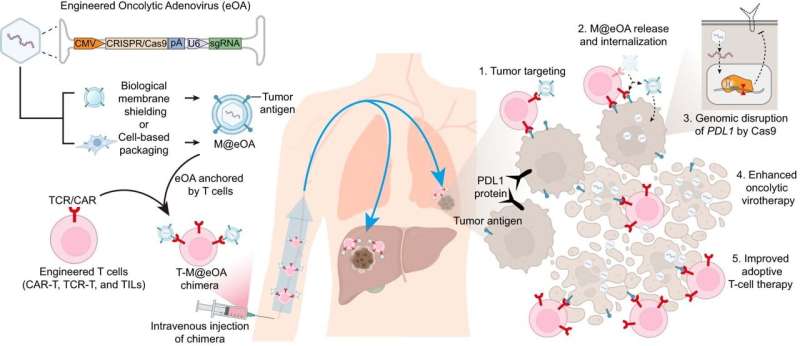February 12, 2024 report
This article has been reviewed according to Science X's editorial process and policies. Editors have highlighted the following attributes while ensuring the content's credibility:
fact-checked
peer-reviewed publication
trusted source
proofread
New approach combines oncolytic virotherapy and adoptive T cell therapy for cancer treatment

A multi-institutional team of Chinese microbiologists and pharmacologists has developed a novel way to fight cancerous tumors. Called ONCOTECH, it combines oncolytic virotherapy and adoptive T cell therapy for treatment of patients with cancerous tumors. The study is published in the journal Nature Biotechnology.
Oncolytic virotherapy involves the use of one or more viruses that work to selectively infect and kill tumor cells, while simultaneously stimulating the immune system to attack the same tumors. Adoptive T cell therapy is a cancer-fighting technique that involves the use of engineered T cells programmed to recognize and attack tumor cells.
In this new study, the researchers developed a therapy approach that involves both techniques. Called ONCOTECH, it is developed to physically attach oncolytic viruses onto T cell surfaces by using engineered biological membranes with T cell-specific antigens, resulting in the use of oncolytic adenoviruses (OAs). It also involves the encoding of a CRISPR–Cas9 system to target the PD-L1 gene, which is often overexpressed by tumor cells as a means to evade an immune system attack.
Therapy using ONCOTECH involves delivering OAs to tumor sites where they are released and internalized by tumor cells. The OAs disrupt the PD-L1 gene and kick off oncolysis, while the T cells incite cytotoxic effects and produce cytokines. Together, they result in enhanced antitumor immunity and improve therapeutic outcomes due to reductions in tumor size.
The research team tested the ONCOTECH approach using multiple cancerous mouse models, including melanoma, lung cancer, pancreatic cancer and glioblastoma. They found that use of ONCOTECH to inhibit tumor growth was more effective than using OAs or T cells alone or mixing them physically, and in prolonging survival of the test mice. They also demonstrated the feasibility of using the ONCOTECH approach in a humanized PDX model of pancreatic cancer using organoids from patients along with CAR-T cells.
More information: Yuxuan Chen et al, An oncolytic virus–T cell chimera for cancer immunotherapy, Nature Biotechnology (2024). DOI: 10.1038/s41587-023-02118-7
© 2024 Science X Network


















